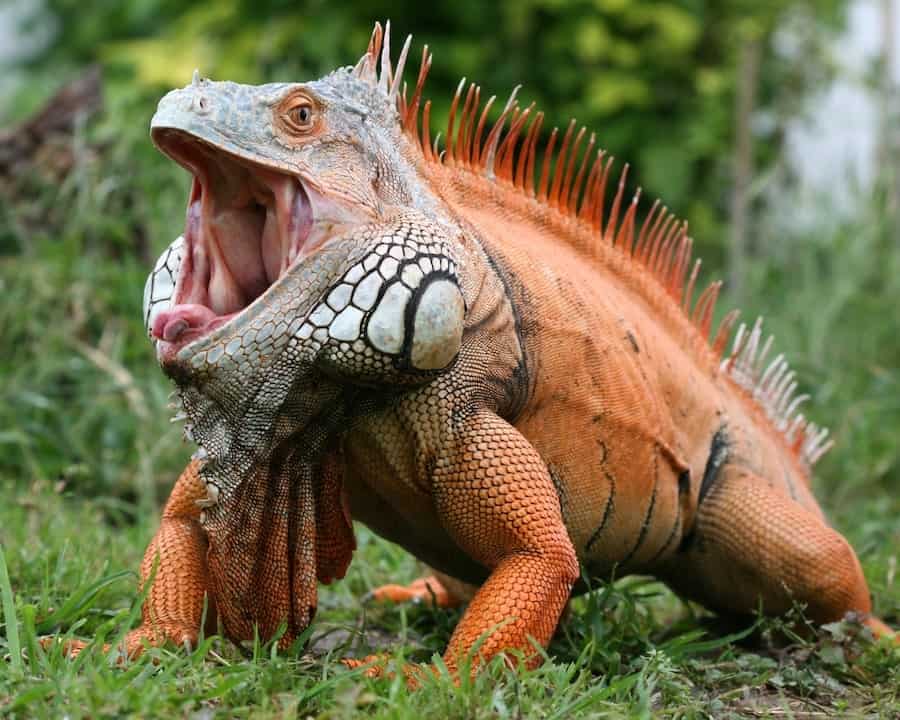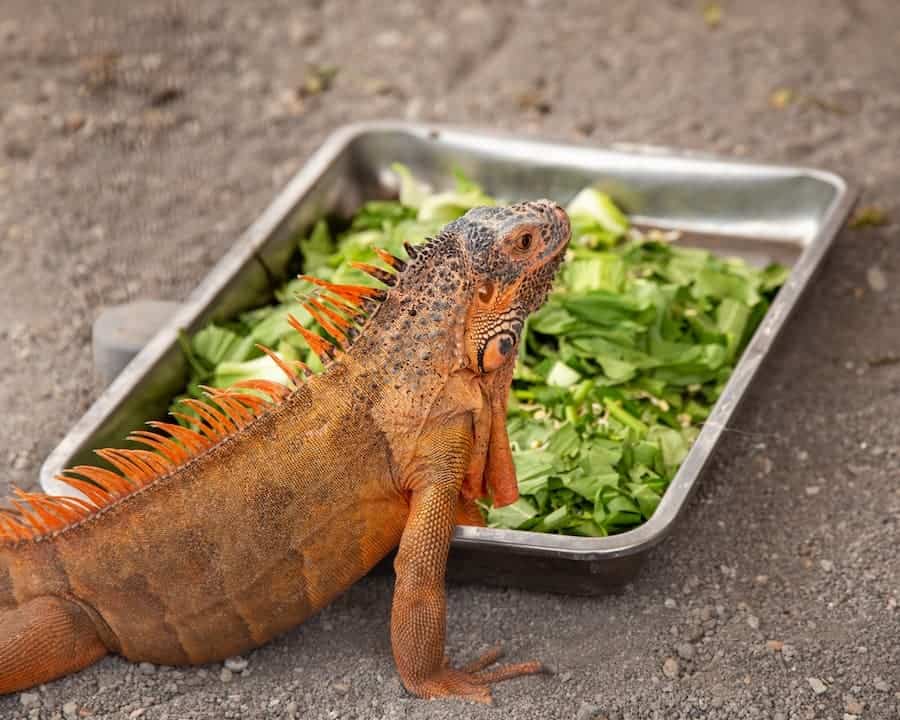Iguanas are fickle pets, but they can live a long time with the right care and diet. This begs the question, what do iguanas eat?
Iguanas eat leafy greens, such as kale or spinach. They can also eat a small amount of fruit (up to 15% of its diet), an array of vegetables. Supplements, especially calcium supplements, are highly suggested.
In the guide below, I’ll outline the food your iguana can eat (even when he’s a baby) and foods to avoid giving him.
What Do Pet Iguanas Eat?
Iguanas need calcium-rich foods, which should account for 40% to 50% of their diet. However, as much as 90% of an iguana’s diet will consist of leafy greens. Your reptile is, after all, an herbivore.
In the past, iguanas were thought to be insectivores, but since then, it’s been well-established that the green iguana persists on one of three things:
- Leaves
- Flowers
- Fruits
A general consensus is states green iguanas should eat:
40% – 50% Leafy Greens

Leafy green vegetables that are most commonly fed to pet iguanas are:
- Beet greens
- Bok choy
- Collard greens
- Dandelion greens
- Kale
- Mustard greens
- Spinach
You can also feed an iguana any of the following to satisfy its green veggie requirements: carrot tops, escarole, leeks, parsley, Swiss chard, romaine lettuce and more.
Important: In one of my favorite books, “Green Iguana The Ultimate Owner’s Manual,” author James Hatfield cautions that feeding just lettuce can cause your iguana to die. He needs a mix of foods to be healthy.
Also, try to avoid overfeeding your iguana oxalates and phytates, which can impact nutrient absorption. Be cautious of this when feeding spinach, chard and other veggies.
30% – 40% Other Veggies

On top of leafy greens, a major portion of your iguana’s diet should consist of other veggies, such as:
- Carrots
- Frozen mixed veggies
- Green beans
- Peas
- Okra
- Zucchini
Cooked legumes are another important addition to an iguana’s diet.
10% – 15% Fruit

Occasional fruits are good for your iguana, but they should never be a major part of their diet. However, the phosphorus in the fruit is a good reason to add them to his diet.
Listed below are a few of the best fruits which you can include in a balanced iguana diet. Click the link to be redirected to a detailed guide of that fruit.
- Blackberries
- Blueberries
- Cucumbers
- Raspberries
- Strawberries
- Grapes
- Plums
- Bananas
- Apples
- Pears
- Peaches
- Kiwis
- Mangos
- Tomatoes
0% – 4% Grains

A very small amount of grains is a natural part of an iguana’s diet and can be added regularly or on occasion. Some of the most common grains for these reptiles include:
- Cooked pasta – they love it
- Cooked rice
- Whole grain bread
Pasta is a favorite for iguanas, and they will know when you’re cooking it and wait intently in their enclosure for you to feed them some.
However, you do need to be cautious about not overfeeding grains because they can cause your reptile to become obese.
1% – 3% Supplements
Supplements can help maximize your iguana’s diet, and you’ll want to add a few items to their diet:
- Meat dog food, made for old dogs
- Monkey biscuit
- Tofu
- Commercial-grade iguana food
If you maintain your iguana’s diet properly, you likely won’t need much supplementation to keep him healthy. You do want to be cautious with protein supplementation because it’s a delicate balancing act.
Supplementing too much protein can be bad for your pet iguana.
Some owners have had their iguanas die because of feeding too much protein over a prolonged period of time. Too much protein can lead to calcification problems with the aorta, kidneys, intestines and more.
Special Note
Your iguana has a very unique digestive system. Even in the wild, when he pulls leaves off of plants, he will often eat them whole. However, digestion and absorption suffer due to this practice.
If you want to promote digestion, consider chopping up the iguana’s food.
Carrots or harder substances should be finely grated or chopped up for your reptile. While it may take some more time to chop the food, your iguana will be much happier.
What do Baby Pet Iguanas Eat?

Baby iguanas eat two times per day or more, and they eat a diet that is very similar to an adult iguana. You’ll want to feed the baby a well-balanced diet and monitor his general health.
At this stage in their growth and development, you may want to spend more time:
- Chopping food up for easy digestion
- Limiting potentially dangerous foods
You can allow your baby iguana to eat freely while they’re growing because they need the added nutrients. However, around age 4 or 5, you may cut back on food to prevent obesity.
What do Iguanas Eat in the Wild?

Wild iguanas have a great life – roaming around, basking in the sun and eating anything that they can find. The diet of a wild iguana is highly dependent on its environment and natural habitat.
In the wild, iguanas typically eat:
- Leaves
- Flowers
- Fruits
A wild iguana doesn’t concern itself with portions. Instead, they will eat what they find while they’re roaming. They may even eat an occasional insect or part of a leaf they find on the ground.
What Should Iguanas Not Eat?

Iguanas are resilient, but they rely on you to help them maintain their diet in captivity. If you feed your iguana the wrong food items, it can make them sick.
Some of the most important foods to avoid or limit are:
- Tofu (fine in moderation, but not daily)
- Animal proteins
- Lettuce (it’s not enough on its own)
- House plants (they can be toxic)
- Milk products (iguanas simply lack the digestive system for them)
- Acidic foods
You’ll even want to be cautious of the dirt in your houseplants or the substrates that you buy. Some plants have pellets in the dirt, which your iguana may want to taste once in a while.
These pellets can be harmful to your pet, so keep them away from houseplants to avoid potential toxicity issues.
Caution
Take care when feeding an iguana supplements, as they can often cause issues. Monkey biscuits and canned dog food can be problematic if fed to the iguana too often. You may find supplementing once every 4 – 6 weeks will suffice.
Also, be cautious of oxalate-heavy veggies, such as spinach and kale.
Kale and spinach are a good addition to an iguana’s diet, but moderation is key to avoiding oxalate issues.
What is Toxic to Iguanas?

Iguanas are interesting reptiles who like to try and eat the oddest things – and some of those things can be dangerous.
As their caregiver, it’s up to you to prevent your pet from eating foods that are toxic.
Foods that are dangerous or toxic to iguanas include:
- Wild foods, particularly azaleas
- Regular cat and dog food
- Pinkies/mice
- Oak
- Avocado
- Navy beans
- All nightshades
- Cacao
- Coffee
- Daffodils
- Elderberry
- Eucalyptus
- Milkweed
- Morning glory
- Yam beans
As a general rule of thumb, it’s best to stick with foods that you know are safe for your iguana and recommended by experts. These are foods that have the nutrients your iguana needs to stay healthy.
How Often do Iguanas Eat?

Young iguanas often eat twice a day as they’re growing, but an adult iguana will often eat once a day. If your iguana is overweight, feeding it once every other day until its weight is under control is acceptable.
Did you know that one of the signs of a healthy iguana is that he eats and drinks daily? I wrote an entire article on this very topic called “11 Signs of a Healthy Iguana.”
What is The Best Time of Day to Feed Your Iguana
Most iguana owners find that feeding is best in the morning to allow for full digestion throughout the day. Remaining consistent with your reptile’s feeding time is crucial to their general health.
If you can’t feed your iguana first thing in the morning, the early afternoon will suffice.
Do Iguanas Eat at Night?

No, iguanas do not eat at night. These reptiles only eat during the day because the heat helps their digestion.
Iguanas typically sleep, or rest, at night.
Reasons Why Your Iguana May Stop Eating

An iguana may stop eating for a number of reasons. These reptiles may refuse food if:
- The temperature is too cold
- It’s breeding season
- He’s shedding
- He’s sick
If you just brought your iguana home, he may be refusing to eat because he’s still adjusting to his new home.
Changes to your iguana’s routine or environment can also cause stress, which can affect your pet’s appetite.
If your iguana isn’t eating and you’re concerned about him, I recommend reading one of the recent guides I’ve written, titled “Top 15 Reasons Why Your Iguana is Not Eating.”
What to do if Your Iguana Stops Eating
If your iguana stops eating, the first thing you should do is contact your veterinarian. Your vet can perform an examination to see if a medical issue is the problem.
Check out this post about how long iguanas can survive without food to learn more.
In some cases, force-feeding may be necessary to keep the iguana alive and healthy.
How to Force Feed Your Iguana?
If you can’t get your iguana to eat, force-feeding may be necessary. It’s important to follow your veterinarian’s advice and recommendations on force-feeding.
Typically, iguana owners feed their iguanas a slurry that consists of blended leafy greens and fruit.
When force-feeding, be patient and take it slow. Moving too quickly could cause aspiration, where your lizard inhales the slurry rather than eating it.
It’s also important to work on rehydrating your iguana first. A dehydrated iguana may have difficulty digesting the fruits and greens in the slurry.
To see how force-feeding works, watch the video below.
In the video above, you can see how they hold the iguana’s head and throat up to ensure he swallows the slurry. Depending on your iguana’s mood, you may also have to hold his mouth open to ensure the slurry gets into his mouth.
Force-feeding is often a two-person job, and it’s one that needs to be done with great care and only under the recommendation of your vet.
Best Iguana Supplements

One of the biggest challenges of owning an iguana is getting its diet just right. Even with the best information and access to high-quality food, it’s still difficult to mimic an iguana’s natural diet in the wild.
Experts argue that it may not be possible to provide these lizards with all of the nutrients they would get from their wild diets with food from your local grocery store.
But supplements may help bridge that gap, such as:
Calcium
Calcium deficiencies are common among captive iguanas. This mineral plays a crucial role in an iguana’s health. It affects their bone growth and muscle movement.
It’s not easy to provide an iguana with all of the calcium it needs from diet alone. Supplements and the proper lighting setup can help maintain a proper balance.
When choosing calcium supplements, avoid products with:
- Added phosphorous
- Calcium lactate
- Added vitamin D3 or A
The optimal calcium sources for iguanas are cuttlebone and calcium carbonate.
Vitamin D3
Natural vitamin D3 is best for iguanas, but if you have trouble exposing your lizard to natural sunlight, a vitamin D3 supplement may help.
UV lights should cover their vitamin D3 needs, but a weekly supplement dose may help ensure that your iguana maintains the right levels of this nutrient.
Multivitamins
Today, you can find multivitamin products made specifically for iguanas that can help address any nutrient deficiencies your pet may experience.
Each multivitamin product will have its own recommendations for dosage and frequency. Make sure that you consult with your vet before giving any supplements and follow dosage directions on the packaging.
How to Feed Supplements to Your Iguana
Dosage can be tricky when feeding your iguana supplements. Your vet may have some recommendations based on the size and type of iguana that you own. The supplement’s label will also have dosage recommendations that you should follow.
Supplements may come in tinctures or as powders.
To feed them to your iguana, you can:
- Sprinkle a pinch on their food
- Add the recommended number of drops to their food
You may find that adding supplements to your iguana’s favorite food will make it easier for him to take it.
While it may be tempting to add tinctures to your iguana’s water, they don’t drink often enough to make this a reliable way to feed supplements.
Supplements can help you keep your iguana happy and healthy. I recommend reading my post titled “Cost of Owning an Iguana in 2022 & How to Save” to learn more about supplements for your pet.
Frequently Asked Questions
Diet is one of the biggest concerns for iguana owners and rightfully so. An unhealthy or unbalanced diet can make an iguana more susceptible to disease or illness.
Unfortunately, there are a lot of misconceptions about what iguanas can and cannot eat. Here are some of the most frequently asked questions I see about iguanas and their diets.
Do iguanas eat mice?
No. Iguanas are herbivores. You may hear of many iguana keepers and even sellers recommending feeding mice or pinkies to iguanas.
However, many experts agree that mice are not an ideal food source for iguanas. Those that do feed mice and other animal proteins find that their iguanas only live for a year or two.
Do iguanas eat bugs?
In the wild, iguanas don’t purposefully eat bugs. They may incidentally consume bugs crawling on the plants or fruits they’re eating, but generally, they do not forage for bugs as a food source.
Are iguanas herbivores?
Yes, iguanas are herbivores. Previously, experts thought iguanas were insectivores or even omnivores. However, modern research has confirmed that these lizards are, indeed, herbivores.
To be specific, iguanas are “folivores,” a specific type of herbivore that primarily eats leaves.
These lizards may accidentally ingest a bug or two that’s crawling on a leaf they’re eating, but they don’t actively seek out insects for food.
Do iguanas eat grass?
Iguanas can eat grass, but it won’t provide them with much nutritional benefit. If you do plan to feed your lizard grass, make sure that it’s grown in organic soil.
Do iguanas eat crickets?
Yes, technically, iguanas can eat crickets. However, many experts advise against feeding any type of insect or worm to iguanas. In the wild, these lizards don’t eat insects even when they’re readily available.
Do iguanas eat mealworms?
Yes, iguanas can technically also eat mealworms. But, like with crickets, they are not an ideal food for these reptiles. Iguanas do need some protein in their diets, but plant-based options are better suited for their digestive systems.

